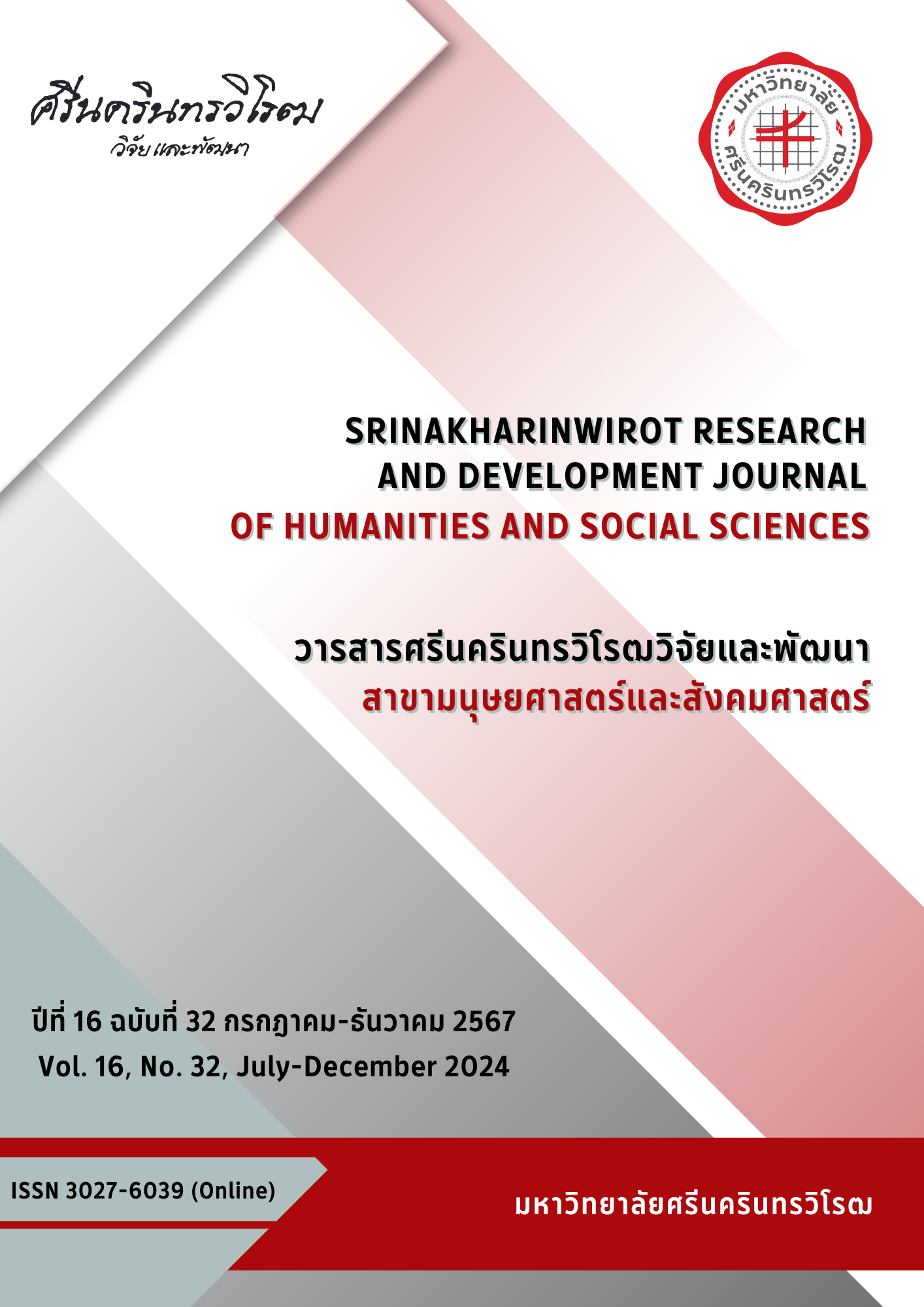THE IDENTITY OF MUDMEE SILK PATTERNS: CULTURAL WISDOM HERITAGE OF KHON KAEN FOLKLORE MASTERS
Keywords:
Identity, Mudmee Silk Pattern, Cultural Wisdom Heritage, Folklore MastersAbstract
This research studies the identity and symbols patterns of traditional Mudmee silk and applied Mudmee silk patterns, and the interpretation of mudmee silk patterns in the context of folklore masters in Chonnabot District, Khon Kaen Province by qualitative research, in-depth interviews, participant observation of stakeholders and documentary research analysis. Purposive sampling was used to select well-known regional folklore masters in the area aged over 40 with over 20 years of continuous experience in making Mudmee silk. The goal swas to compile a significant database of Mudmee silk patterns by folklore masters as intangible cultural heritage to add value to local culture in future. Results were that Chonnabot District was considered the center of Mudmee silk in Khon Kaen Province. Nationally recognized Mudmee silk has been registered by geographical indication (GI). The identity of Mudmee silk consisted of patterns and weaving techniques. Creation of Mudmee silk patterns by folklore masters was seen as craft wisdom requiring skill and accumulated experience to achieve proficiency. Pattern identities inherited and considered as prototypes of the Madmee silk of Chonnabot District included Kong, Khan Mak Beng, Phra Thep, and Choeng Thian. Original unique colors included tamarind seed, red, purple, and green. The current identity of Mudmee silk patterns results from applying traditional patterns, drawing inspiration from surroundings, lifestyles, the environment, plants and animals, tools, appliances, and jewelry, media, religious beliefs, and local identities. These lead to development of a range of multidimensional colors.
Downloads
References
กรมส่งเสริมวัฒนธรรม. (2559). งานช่างฝีมือดั้งเดิม : มรดกภูมิปัญญาทางวัฒนธรรมของชาติ. กรุงเทพฯ: องค์การสงเคราะห์ทหารผ่านศึกในพระบรมราชูปถัมภ์.
ธนาคารแห่งประเทศไทย สำนักงานภาคเหนือ. (2553). สุนทรีย์แห่งลีลา ผืนผ้าแพรพรรณ พินิจผ้าชิ้นเด่นของพิพิธภัณฑ์ธนาคารแห่งประเทศไทย สำนักงานภาคเหนือ. เชียงใหม่: บริษัทนพบุรีการพิมพ์ จำกัด.
สำนักงานพัฒนาชุมชนอำเภอชนบท จังหวัดขอนแก่น. (2562). ประวัติ อำเภอชนบท ขอนแก่น จากอดีต. สืบค้นเมื่อ 24 กรกฎาคม 2565, จาก https://district.cdd.go.th/chonnabot/about-us/100011-2
สถาบันส่งเสริมศิลปหัตถกรรมไทย (องค์การมหาชน). (2561). ผ้าไหมมัดหมี่ อำเภอชนบท จังหวัดขอนแก่น. สืบค้นเมื่อ 15 มิถุนายน 2565, จาก https://www.sacit.or.th/th/detail/2018-09-14-11-35-v-5BW
กรมทรัพย์สินทางปัญญา. (2565). การขึ้นทะเบียนบ่งชี้ทางภูมิศาสตร์. สืบค้นเมื่อ 25 กุมภาพันธ์ 2565, จาก https://www.ipthailand.go.th/images/781/s_53100035_1.pdf
ศูนย์ส่งเสริมศิลปาชีพระหว่างประเทศ (องค์การมหาชน). (2553). ผ้าไทย มรดกแห่งภูมิปัญญาของไทย. กรุงเทพมหานคร. บริษัท เอ.พี.กราฟิค ดีไซน์ และการพิมพ์ จำกัด.
กัญญารินทร์ ไชยจันทร์. (2565). ภูมิปัญญาของปราชญ์ท้องถิ่นผ้าไหมมัดหมี่ในอำเภอชนบท จังหวัดขอนแก่น เพื่อการท่องเที่ยวเชิงสร้างสรรค์. วารสารการบริการและการท่องเที่ยวไทย, 17(2), 88-100.
สวัสดิ์ แก้วแบน, ยุภา ประยงค์ทรัพย์, และกชนิภา อุดมทวี. (2562). ภูมิปัญญาการทอผ้าไหมลายโบราณของชุมชนบ้านแกใหญ่ อำเภอเมือง จังหวัดสุรินทร์. วารสารวิชาการ มจร บุรีรัมย์, 4(1), 71-85.
ดวงเด่น บุญปก (2563). อัตลักษณ์และสัญลักษณ์ของผ้าไหมพื้นเมืองกลุ่มเขมรถิ่นไทย. วารสารวิชาการคณะมนุษยศาสตร์และสังคมศาสตร์, 10(1), 91-102.
กิตติ์ธนัตถ์ ญาณพิสิษฐ์. (2556). ลวดลายผ้าทอร่วมสมัยภายใต้จินตนาการใหม่. วารสารศิลปกรรมศาสตร์มหาวิทยาลัยขอนแก่น, 5(2), 195-213.
กรมหม่อนไหม. (2562). ผ้าไหมมัดหมี่ชนบท. สืบค้นเมื่อ 15 มีนาคม 2566, จาก https://qsds.go.th/newocss/wp-content/uploads/sites/74/2022/09/kk-mudmeechon.pdf
Downloads
Published
How to Cite
Issue
Section
License
Copyright (c) 2024 Srinakharinwirot Research and Development Journal of Humanities and Social Sciences

This work is licensed under a Creative Commons Attribution-NonCommercial-NoDerivatives 4.0 International License.
Srinakharinwirot Research and Development Journal of Humanities and Social Sciences is licensed Under a Creative Commons Attribution-NonCommercial-NoDerivs 4.0 International (CC-BY-NC-ND 4.0) License, Unless Otherwise Stated. Please Read Journal Policies Page for More Information on Open Access, Copyright and Permissions.



